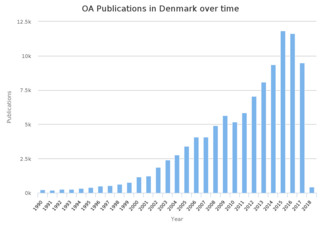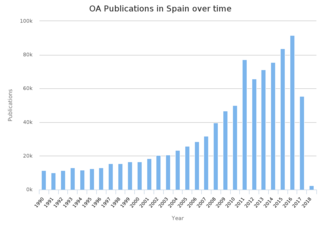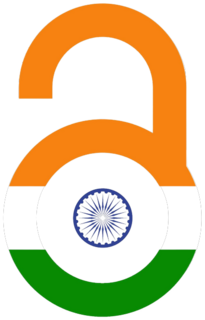Related Research Articles

The five laws of library science is a theory that S. R. Ranganathan proposed in 1931, detailing the principles of operating a library system. Many librarians from around the world accept the laws as the foundations of their philosophy.

Open access (OA) is a set of principles and a range of practices through which research outputs are distributed online, free of access charges or other barriers. With open access strictly defined, or libre open access, barriers to copying or reuse are also reduced or removed by applying an open license for copyright.
Michael Gorman is a British-born librarian, library scholar and editor/writer on library issues noted for his traditional views. During his tenure as president of the American Library Association (ALA), he was vocal in his opinions on a range of subjects, notably technology and education. He currently lives in the Chicago area with his wife, Anne Reuland, an academic administrator at Loyola University.

The Directory of Open Access Journals (DOAJ) is a website that hosts a community-curated list of open access journals, maintained by Infrastructure Services for Open Access (IS4OA). It was launched in 2003 with 300 open access journals. The project defines open access journals as scientific and scholarly journals making all their content available for free, without delay or user-registration requirement, and meeting high quality standards, notably by exercising peer review or editorial quality control. DOAJ defines those as open access journals where an open license is used so that any user is allowed immediate free access to the works published in the journal and is permitted to read, download, copy, distribute, print, search, or link to the full texts of [the] articles, or use them for any other lawful purpose. The mission of DOAJ is to "increase the visibility, accessibility, reputation, usage and impact of quality, peer-reviewed, open access scholarly research journals globally, regardless of discipline, geography or language."

Library 2.0 is a proposed concept for library services that facilitate user contributions and other features of Web 2.0, which includes online services such as OPAC systems. The concept is based on Radical Trust, and proponents suggest it will eventually replace traditional libraries. The term "Library 2.0" was coined by Michael Casey in 2006 on his blog Library Crunch.

Frederick Gridley Kilgour was an American librarian and educator known as the founding director of OCLC, an international computer library network and database. He was its president and executive director from 1967 to 1980.
Andrew K. Pace is an American librarian and author. He is the Executive Director, Technical Research for OCLC, having previously served as OCLC's Executive Director for Management Services.
Open access to scholarly communication in South Africa occurs online via journals, repositories, and a variety of other tools and platforms. Compared to other African nations, open access in South Africa has grown quickly in recent years.

In Portugal, the first open access initiatives were carried out by the University of Minho with the creation of RepositóriUM in 2003 and the definition of an institutional policy of self-archiving in 2004. In the following years began SciELO Portugal, for the publication of open access journals, and new repositories in several higher education institutions. The Open Access Scientific Repository of Portugal (RCAAP) launched in 2008.

Open access to scholarly communication in Denmark has grown rapidly since the 1990s. As in other countries in general, open access publishing is less expensive than traditional, paper-based, pre-Internet publishing.

Open access to scholarly communication in Germany has evolved rapidly since the early 2000s. Publishers Beilstein-Institut, Copernicus Publications, De Gruyter, Knowledge Unlatched, Leibniz Institute for Psychology Information, ScienceOpen, Springer Nature, and Universitätsverlag Göttingen belong to the international Open Access Scholarly Publishers Association.

Open access to scholarly communication in Austria has developed in the 2010s largely through government initiatives. The Austrian Science Fund and Universities Austria launched the "Open Access Netzwerk Austria" in 2012 to coordinate country-wide efforts. The "E-Infrastructures Austria" project began in 2014 to develop repositories. The international advocacy effort "OpenscienceASAP – Open Science as a Practice" is based in Austria.

In Spain, the national 2011 "Ley de la Ciencia, la Tecnología y la Innovación" requires open access publishing for research that has been produced with public funding. The first peer-reviewed open access Spanish journal, Relieve, began in 1995. Publishers CSIC Press and Hipatia Press belong to the international Open Access Scholarly Publishers Association.
Open access scholarly communication of Norway can be searched via the Norwegian Open Research Archive (NORA). "A national repository consortium, BIBSYS Brage, operates shared electronic publishing system on behalf of 56 institutions." Cappelen Damm Akademisk, Nordic Open Access Scholarly Publishing, University of Tromsø, and Universitetsforlaget belong to the Open Access Scholarly Publishers Association. Norwegian signatories to the international "Open Access 2020" campaign, launched in 2016, include CRIStin, Norsk institutt for bioøkonomi, Norwegian Institute of Palaeography and Historical Philology, Norwegian University of Science and Technology, Oslo and Akershus University College of Applied Sciences, University of Tromsø, University of Bergen, University of Oslo, and Wikimedia Norge.
Open access to scholarly communication in Sweden is relatively widespread. In 2010 the Swedish Research Council began requiring its grantees to make research results available in open access form. Lund University Libraries and Stockholm University Press belong to the international Open Access Scholarly Publishers Association.
In January 2008, Russian, Belarusian, and Ukrainian academics issued the "Belgorod Declaration" in support of open access to scientific and cultural knowledge. Russian supporters of the international "Open Access 2020" campaign, launched in 2016, include Belgorod State University, National Electronic Information Consortium (NEICON), and Webpublishers Association.
In Ukraine, a 2007 law requires open access publishing of research created through public funding. In January 2008, Ukrainian, Belarusian, and Russian academics issued the "Belgorod Declaration on open access to scientific knowledge and cultural heritage." Ukrainian academics issued another statement in June 2009 in support of open access.

Open access scholarly communication of Greece is preserved in repositories maintained by several academic institutions.
Open access to scholarly communication in Hungary has developed in recent years through digital repositories and academic publishers, among other means. In 2008 several academic libraries founded the Hungarian Open Access Repositories (HUNOR) consortium.

Open access in India was begun in May 2004, when two workshops were organized by the M S Swaminathan Research Foundation, Chennai. This laid the foundation for the Open Access movement in India. In 2006, the National Knowledge Commission in its recommendations proposed that "access to knowledge is the most fundamental way of increasing the opportunities and reach of individuals and groups". In 2009, the Council of Scientific & Industrial Research (CSIR) began requiring that its grantees provide open access to funded research. In 2011, the Open Access India forum formulated a draft policy on Open Access for India. Currently, the Directory of Open Access Journals lists 326 open access journals published in India, of which 233 have no fees.
References
- ↑ "The Gold Open Access Journals Landscape 2011-2014". Directory of Open Access Journals news service. 9 December 2015. Retrieved 16 August 2018.
- ↑ "Digital Libraries", Current Cites, US, January 1998, ISSN 1060-2356
- ↑ "LITA Presidents". American Library Association. 24 July 2006. Retrieved 16 August 2018.
- ↑ April Bohannan (April 1996). "Future Libraries: Dreams, Madness, & Reality (Book Review)". The Library Quarterly . 66. doi:10.1086/602871. ISSN 0024-2519.
- ↑ Future libraries : dreams, madness & reality (catalog listing). OCLC 31605103.
- ↑ David Gibbs (September 2011). "Open Access: What You Need to Know Now". Journal of Academic Librarianship . 37 (5): 452–453. doi:10.1016/j.acalib.2011.06.017. ISSN 0099-1333.
- ↑ Kay Neville (August 2013). "Librarian's Guide to Micropublishing". Australian Library Journal . 62. doi: 10.1080/00049670.2013.811768 . ISSN 0004-9670.
- ↑ Judith Hudson (December 1990). "MARC for Library Use, Second Edition". Information Technology and Libraries. 9. ISSN 0730-9295.
- ↑ "Crawford, Walt", WorldCat , US: OCLC, retrieved 10 July 2018
- ↑ "Introducing Walt Crawford's "Cites & Insights"", OA Librarian, November 15, 2005 – via Blogspot